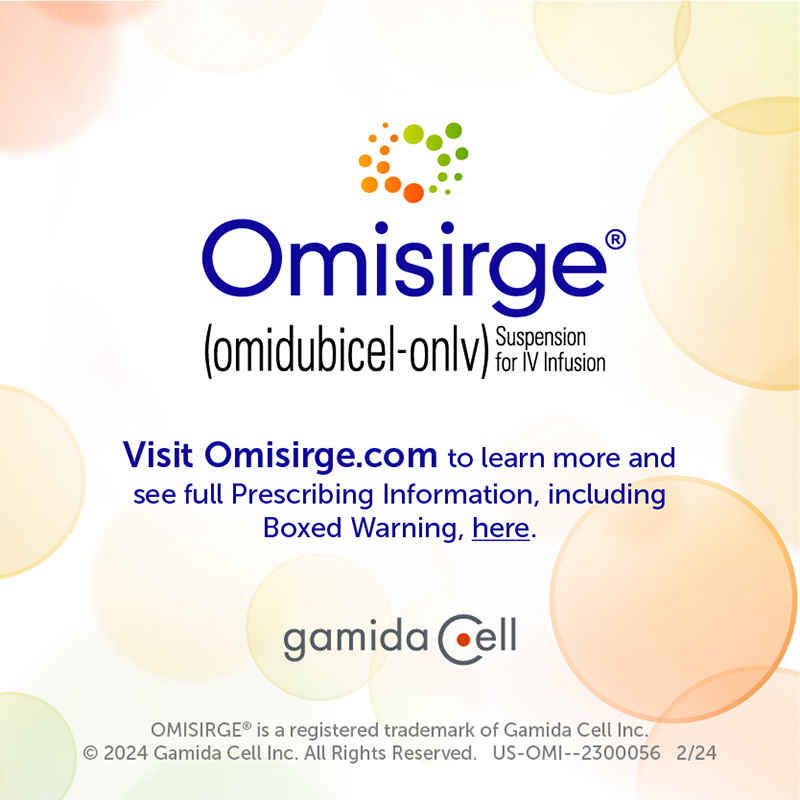You are about to leave this website for another external website outside of the control of Gamida Cell. Gamida Cell has no responsibility for the content of such other sites and is not liable for any damages or injury arising from that content. Any links to other sites are provided merely as a convenience to the users of this website.
Gamida Cell is developing allogeneic cell therapy products and candidates that are potentially curative for patients with hematologic malignancies. We are committed to supporting healthcare professionals who care for patients and share our goal of improving clinical outcomes.
Clinical Trials
Gamida Cell’s clinical development candidates are designed to address areas of significant medical need. Read more about our ongoing clinical trials of these investigative therapies and uses below. For more information or questions, please contact us.
Contact UsOMISIRGE® (omidubicel-onlv) FOR SEVERE APLASTIC ANEMIA
Read MoreOmisirge is being evaluated in an ongoing investigator-sponsored Phase 1/2 study in patients with severe aplastic anemia. For more information about the study, please visit www.clinicaltrials.gov (NCT03173937).
The safety and efficacy of Omisirge for severe aplastic anemia has not been established by the U.S. Food and Drug Administration or any other health authority.
GDA-201
Read MoreGDA-201 is an enhanced and expanded intrinsic NK cell therapy candidate. The study of the cryopreserved formulation of GDA-201 is currently open to enrollment at Henry Ford Cancer Institute (Detroit, MI), the Masonic Cancer Center at the University of Minnesota, Mayo Clinic Jacksonville (FL), Cardinal Bernardin Cancer Center at Loyola University (MD), Dana-Farber/Mass General Brigham Cancer Care (MA) and Memorial Sloan Kettering Cancer Center (NY). The Phase 1 portion of the study is designed to evaluate the safety of GDA-201 in patients with follicular lymphoma (FL), diffuse large B-cell lymphoma (DLBCL)/high grade B-cell lymphoma (HGBCL), marginal zone lymphoma or mantle cell lymphoma. The Phase 2 expansion phase is designed to evaluate the safety and efficacy of GDA-201 in two patient cohorts, FL and DLBCL/HGBCL. The study will include patients who have relapsed or refractory lymphoma after at least two prior treatments. For more information about the study, please visit www.clinicaltrials.gov (NCT05296525).
GDA-201 has been evaluated in a Phase 1 investigator-led study in patients with refractory non-Hodgkin lymphoma (NHL) and multiple myeloma and demonstrated that GDA-201 generally was well tolerated in 35 patients. Of the 19 patients with NHL, 13 complete responses and one partial response were observed (CRR = 68%, ORR = 74%). No dose-limiting toxicities were observed. The most common grade 3/4 adverse events were neutropenia and thrombocytopenia, febrile neutropenia (n=2), increased creatinine, hyponatremia and pulmonary edema; all events were transient.
In two-year follow up data in the same Phase 1 study, an overall survival rate of 78% at two years with a median duration response of 16 months was observed (Bachanova, et al. ASH 2021. Abstract #3854).
GDA-201 is an investigational therapy and its safety and efficacy have not been established by the U.S. Food and Drug Administration or any other health authority.
Scientific Research
Gamida Cell is proud to work with the scientific community to advance research that aligns with our mission of delivering curative new treatments for patients with cancer. For more information on research topics of interest to Gamida Cell, please contact us.
Contact UsGrants & Sponsorships
Gamida Cell is proud to support the scientific community to advance medical education that aligns with our scientific areas of interest. For more information about Gamida Cell medical education grants and sponsorships, please contact us.
Contact Us
